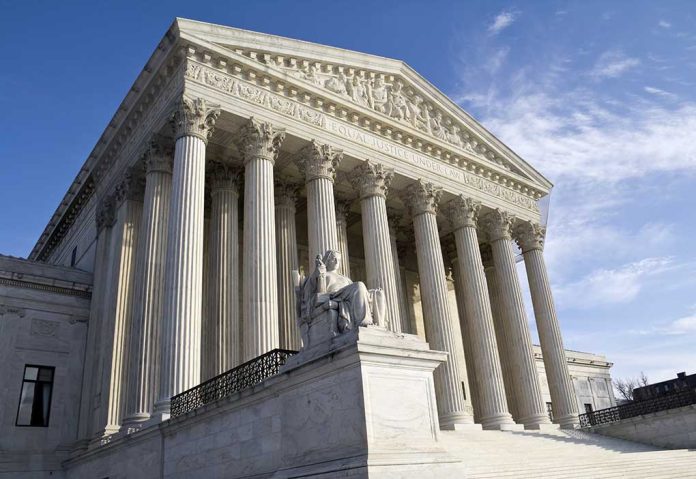
Bipartisan senators have urged the Supreme Court to expand resentencing options under the First Step Act, potentially reducing sentences for thousands of Americans convicted under outdated guidelines.
At a Glance
- Senators from both parties filed a brief supporting expanded resentencing options under the First Step Act
- The case centers on Tony Hewitt, who could see his minimum sentence reduced from 105 to 25 years
- The Supreme Court will hear the case in October 2024, potentially setting a nationwide precedent
- The First Step Act has already led to over 4,000 sentence reductions since 2018
Bipartisan Push for Criminal Justice Reform
In a rare display of bipartisanship, a group of senators including Richard J. Durbin (D), Cory Booker (D), Chuck Grassley (R), and Mike Lee (R) have joined forces to advocate for broader application of the First Step Act. This landmark legislation, passed in 2018, aims to reduce prison populations and promote fairer sentencing practices.
The senators have filed a brief with the Supreme Court, arguing that the Act’s benefits should extend to individuals whose original sentences were vacated and are awaiting resentencing. This move could potentially impact thousands of cases nationwide, correcting past injustices and upholding constitutional rights.
The First Step Act took major steps to increase fairness in our justice system by reducing mandatory minimums and modifying minimum sentencing enhancements.
A Fifth Circuit interpretation would narrow the scope of those provisions. SCOTUS should rule to uphold Congress’s intent. https://t.co/H2HWAXcXKI
— Senator Dick Durbin (@SenatorDurbin) September 23, 2024
The Case at the Center of the Debate
The Supreme Court’s decision will hinge on the case of Tony Hewitt, convicted in 2009 for bank robbery-related charges. Hewitt argues that under the First Step Act, his minimum sentence could be reduced from 105 years to 25 years. The Court’s ruling, expected after the October 2024 term begins, could set a precedent for similar cases across the country.
“In designing the First Step Act, Congress sought to ensure that individuals who committed an offense before the Act was enacted, but who were not yet subject to a sentence for that offense, would benefit,” their filing read.
The senators contend that the federal appeals court’s ruling against Hewitt is too narrow and fails to align with the Act’s intended scope. They argue that the Supreme Court should interpret the law more broadly to fulfill its original purpose of comprehensive criminal justice reform.
A bipartisan group of senators asked the Supreme Court on Monday to allow defendants that have had their original sentences vacated to be resentenced under new criminal justice reforms passed in 2018. https://t.co/lcXJaXWNVw
— The Washington Times (@WashTimes) September 24, 2024
Impact of the First Step Act
Since its implementation in 2018, the First Step Act has made significant strides in reforming the criminal justice system. It has led to over 4,000 sentence reductions through the retroactive application of the Fair Sentencing Act, expanded judicial discretion affecting approximately 1,400 individuals, and resulted in over 2,600 compassionate releases during the COVID-19 pandemic.
“begin to relieve our overcrowded prisons, redirect funding to our most pressing crime prevention efforts, make our communities safer, and ensure the integrity of our justice system.” – Sen. Dick Durbin (D-IL)
The Act has also expanded educational programming and increased participation in drug treatment programs. Perhaps most notably, individuals released under the Act’s provisions have shown a significantly lower recidivism rate of 9.7%, compared to 46.2% for all individuals released from Bureau of Prisons facilities in 2018.
Challenges and Future Outlook
Despite its successes, the First Step Act faces ongoing challenges. Operational issues, such as lack of bed space, have delayed some transfers. Additionally, legal debates and pending Supreme Court cases could further impact the Act’s implementation and interpretation.
As the Supreme Court prepares to hear Hewitt’s case, the decision could have far-reaching implications for countless individuals affected by outdated sentencing practices. The outcome will likely shape the future of criminal justice reform in America, determining whether the First Step Act can fulfill its promise of fairer sentencing and reduced prison populations.
Sources:
- Senators urge Supreme Court to bolster First Step Act’s sentence reduction
- Analyzing the First Step Act’s Impact on Criminal Justice
- Supreme Court Considers the First Step Act’s Lenient Sentencing Provision
- Supreme Court Narrowly Interprets Landmark Reduced Sentencing Law
- The First Step Act: Ending Mass Incarceration in Federal Prisons






